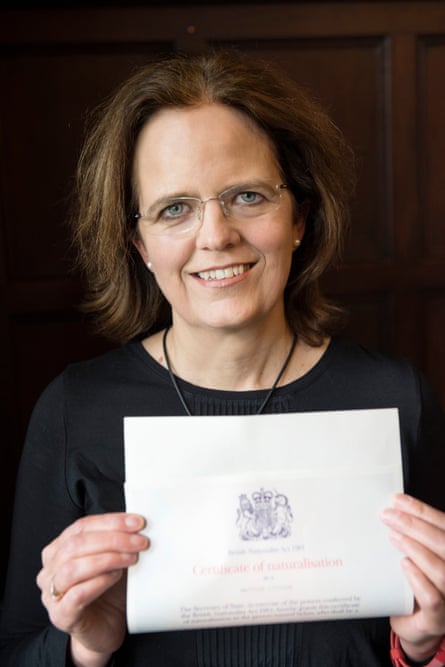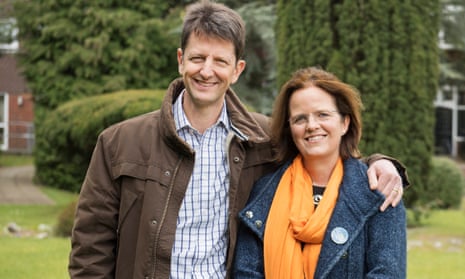A Dutchwoman who has been living in the UK for 24 years, who was told to prepare to leave the country in a case that shocked the nation and prompted a European inquiry into Britain’s treatment of EU nationals, has been given British citizenship.
Monique Hawkins got the paperwork establishing her status as a British national in a 10-minute ceremony in Surrey on Friday.
She now has the right to live and work in the UK permanently after Brexit, irrespective of the outcome of negotiations between Brussels and London.
She swore allegiance to the Queen and completed a “life in the UK” test to prove she was assimilating into British culture, even though she is bilingual, has lived in the country for most of her adult life and is married to a British man with whom she has two British children.
Hawkins, like other EU nationals receiving British citizenship, was handed a standard letter from the home secretary congratulating her on her new status. In a sign of the struggle the Home Office is facing dealing with the volume of applications from EU citizens, the letter was signed by Theresa May, who stepped down as home secretary when she became prime minister almost a year ago.

“I am delighted to finally be British, having felt part of this wonderful and beautiful country for many years now,” said Hawkins. “The ceremony was quick, it felt odd. I have very mixed emotions about it.”
It was a bittersweet moment for the IT consultant. She no longer has to worry about her status post-Brexit but, on the downside, she has learned that she has lost several rights conferred under EU freedom of movement laws.
“Some time after submitting my application in January, I was horrified to learn from a lawyer that in fact by becoming a dual-national British citizen, I have signed away several rights that I had before,” she said.
“In my particular case, this would mean that if my widowed mother in the Netherlands were to need care in the future, I would not be able to bring her over to live with me as a dependent. She is very fit and healthy and has no intention of living here but who knows what might happen in 10 years’ time?”
The first thing Hawkins did following the citizenship ceremony was register to vote in the general election, something that EU citizens are not eligible to do, bar the Irish, Maltese and citizens of the Republic of Cyprus. She said she was “especially pleased” to be able to vote in an election that would affect the future of the three million EU citizens living in the UK.
She said she was concerned about other EU citizens who, after the referendum, discovered they were not entitled to be here because they were caring for a disabled child; were stay-at-home parents; or students who were not notified by the Home Office or their universities that they were required to have private health insurance to stay. “These are the people I worry about, that is what keeps me awake at night,” Hawkins said. She is now working with the 3million grassroots campaign to secure rights for EU citizens and will be part of a delegation going to a European parliament hearing this week on the issue.
She has been asked to speak at at an event organised by the Dutch MEP Sophie in ’t Veld, who set up the parliament’s task force in January to look into the rights of people and families affected by Brexit.
Last December, Hawkins described her treatment by the Home Office as being as “absurd as a Monty Python sketch”.
She had sent officials an 85-page permanent residency application along with documents such as historic employment records, council tax statements and proof of absences from the country. However, the Home Office refused her application on the grounds that she had sent in a notarised copy of her passport rather than her original, which she needed for travelling to the Netherlands to handle the paperwork generated by the death of her father.
“As you appear to have no alternative basis of stay in the United Kingdom, you should now make arrangements to leave,” the rejection letter stated.
The case caused an international furore and, along with others reported on by the Guardian, ultimately led to EU citizens’ rights becoming one of the priorities to be agreed before Brexit trade talks can begin.
The3million will be pushing for a deal on EU citizens to be ringfenced from main negotiations, which would enable the preservation of their rights even if the UK government walked away with no deal.
